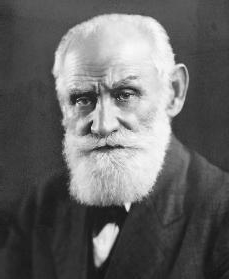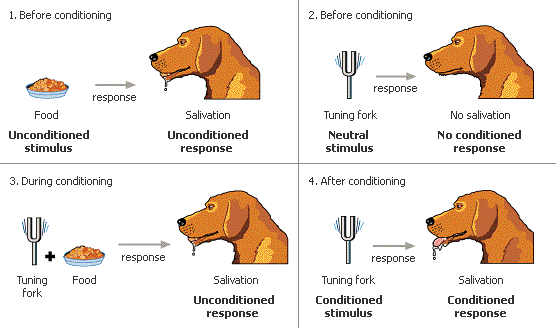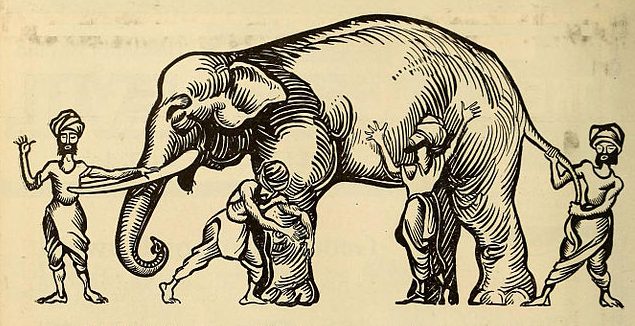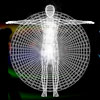The Psychology of Conditioned Reflexes
 One of the first and central figures in our modern present-day psychology was a Russian psychologist and physician named Ivan Petrovich Pavlov (1849-1936). It was Pavlov who
One of the first and central figures in our modern present-day psychology was a Russian psychologist and physician named Ivan Petrovich Pavlov (1849-1936). It was Pavlov who  first discovered and developed what is no doubt the most basic underlying principle of this psychology—a basic tenet called conditioned reflexes. With a group of dogs, Pavlov began his famous experiment. Just before feeding the dogs, he would ring a certain little hand bell, then begin the feeding. After a few days time, Pavlov noticed that after he rang the bell the dogs began to exhibit certain reactions. They would begin to bark and howl and their saliva glands were very strongly activated. In time, Pavlov also noted that any time during the day he rang that bell, the saliva glands were activated; however, if any other bell was used, there was no reaction! It was this reaction Pavlov called a conditioned reflex.
first discovered and developed what is no doubt the most basic underlying principle of this psychology—a basic tenet called conditioned reflexes. With a group of dogs, Pavlov began his famous experiment. Just before feeding the dogs, he would ring a certain little hand bell, then begin the feeding. After a few days time, Pavlov noticed that after he rang the bell the dogs began to exhibit certain reactions. They would begin to bark and howl and their saliva glands were very strongly activated. In time, Pavlov also noted that any time during the day he rang that bell, the saliva glands were activated; however, if any other bell was used, there was no reaction! It was this reaction Pavlov called a conditioned reflex.
 Now, as of today and just as it has always been, all people live just like Pavlov’s dogs, on conditioned reflexes; and as a
Now, as of today and just as it has always been, all people live just like Pavlov’s dogs, on conditioned reflexes; and as a  matter of fact, there is not one single act in the daily life of any individual which is not either directly concerned with or is actually one or a number of conditioned reflexes! However, with the average person, there may be thousands of these conditioned reflexes or even millions. In fact, they form what is more commonly referred to as the subconscious mind. These conditioned reflexes are basic constituents in what is called life and what makes life possible as a normal continuity.
matter of fact, there is not one single act in the daily life of any individual which is not either directly concerned with or is actually one or a number of conditioned reflexes! However, with the average person, there may be thousands of these conditioned reflexes or even millions. In fact, they form what is more commonly referred to as the subconscious mind. These conditioned reflexes are basic constituents in what is called life and what makes life possible as a normal continuity.
These conditioned reflexes can also cause people to do many strange things.  Inversely manifested as a conditioned reflex, the fear of death causes people to dance on top of flagpoles, to sky-dive and drive race cars.
Inversely manifested as a conditioned reflex, the fear of death causes people to dance on top of flagpoles, to sky-dive and drive race cars.
The fear of drowning can inversely make a person a channel swimmer or a scuba diver.
 Sex, in all of its manifestations, is a conditioned reflex; inversely, it can help to create in certain people homosexuality. Inversely, too, certain conditioned reflexes cause many kinds of masochism, sexual gratification through physical pain and suffering or flagellation. A conditioned reflex causes either our foot to move on the gas pedal or the brakes as the traffic lights change, and like Pavlov’s dogs, we drool when we pass a hamburger stand and smell the aroma of cooking meat.
Sex, in all of its manifestations, is a conditioned reflex; inversely, it can help to create in certain people homosexuality. Inversely, too, certain conditioned reflexes cause many kinds of masochism, sexual gratification through physical pain and suffering or flagellation. A conditioned reflex causes either our foot to move on the gas pedal or the brakes as the traffic lights change, and like Pavlov’s dogs, we drool when we pass a hamburger stand and smell the aroma of cooking meat.
Now, after some thinking on the subject, you can see that this subject composition is  indeed a very complex and intricate proposition. Actually, billions of oscillating wave forms are involved, some harmonically attuned and others adversely. All of these little wave forms are part of the psychic anatomy and in many areas oscillate harmonically with it. In some cases and with certain conditioned reflexes, past lifetimes are very actively concerned in this oscillating condition.
indeed a very complex and intricate proposition. Actually, billions of oscillating wave forms are involved, some harmonically attuned and others adversely. All of these little wave forms are part of the psychic anatomy and in many areas oscillate harmonically with it. In some cases and with certain conditioned reflexes, past lifetimes are very actively concerned in this oscillating condition.
 An allergy, like hives from strawberries, is actually a former bloody episode reactivated by the red, juicy strawberry. The conditioned reflex instigates a certain chemical reaction in the body which appears as little bumps called hives. Actually, this reaction and all other similar allergic reactions were subdivided into such consonants as a guilt complex. In reality, the total complex of conditioned reflexes could hardly be divided even though such contemporaries as Freud defined what he called the primary complex as sex.
An allergy, like hives from strawberries, is actually a former bloody episode reactivated by the red, juicy strawberry. The conditioned reflex instigates a certain chemical reaction in the body which appears as little bumps called hives. Actually, this reaction and all other similar allergic reactions were subdivided into such consonants as a guilt complex. In reality, the total complex of conditioned reflexes could hardly be divided even though such contemporaries as Freud defined what he called the primary complex as sex.
The subdivision of this conditioned reflex complex is like carrying coals to Newcastle; or we might find an analogy in  the four blind men who tried to describe an elephant after each one felt a different portion of the elephant‘s anatomy.
the four blind men who tried to describe an elephant after each one felt a different portion of the elephant‘s anatomy.
In any human, this conditioned reflex complex not only incorporates the present life but all other preceding lifetimes, yes, even back and beyond the time where any practical revelations might be attained by a clairvoyant diagnosis – an extension of present-day psychosomatics.
So you see, there isn’t really anything too difficult in  understanding your own personal psychology, provided of course, you can do so objectively and not make your analysis under the insidious and unnoticed influence of a number of conditioned reflexes.
understanding your own personal psychology, provided of course, you can do so objectively and not make your analysis under the insidious and unnoticed influence of a number of conditioned reflexes.
It is also well to remember Pavlov’s dogs in your daily concourse of life and as you go about your life. Are all of the things you do the result of conditioned reflexes or are you more constructively-minded, and can you try to find a more intelligent continuity, a reasonable purpose, or any other factors which would help to keep your face pointed in that forward, upward direction on the path of your personal evolution?
A conditioned reflex is, of course, highly useful, even a way of life to a jungle beast. Even mankind on this planet earth has not yet escaped the boundaries of this conditioned reflex life.
In a more ultimate and progressive position in life, such conditioned reflexes are quite senseless and useless.  Consciousness is maintained as an integrated factor through attunement—attunement which can and does harmonically relate consciousness to an infinitely intelligent infinity. Also, such subversive influences as the fear of death and a host of other earthly fears are no longer present, for in oscillating infinitely there is infinite security.
Consciousness is maintained as an integrated factor through attunement—attunement which can and does harmonically relate consciousness to an infinitely intelligent infinity. Also, such subversive influences as the fear of death and a host of other earthly fears are no longer present, for in oscillating infinitely there is infinite security.
 Therefore, waste no time; begin immediately to separate yourself from the world and Pavlov’s dogs. True, you no longer have a tail to wag but the motivations of your earth life are still, in many respects, just as strong as they are with the animals who have tails to wag.
Therefore, waste no time; begin immediately to separate yourself from the world and Pavlov’s dogs. True, you no longer have a tail to wag but the motivations of your earth life are still, in many respects, just as strong as they are with the animals who have tails to wag.
And when your life is no longer an activated continuity of conditioned reflexes, then mark that place with a headstone with this epitaph engraved, “Here lies my old self—my old life. Rest in peace!”
Excerpt from Tempus Interludium – Vol. I
Posted in Book Excerpts, Tempus Interludiumwith comments disabled.





